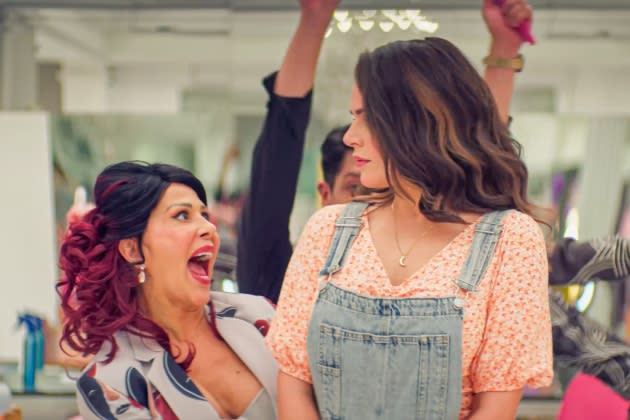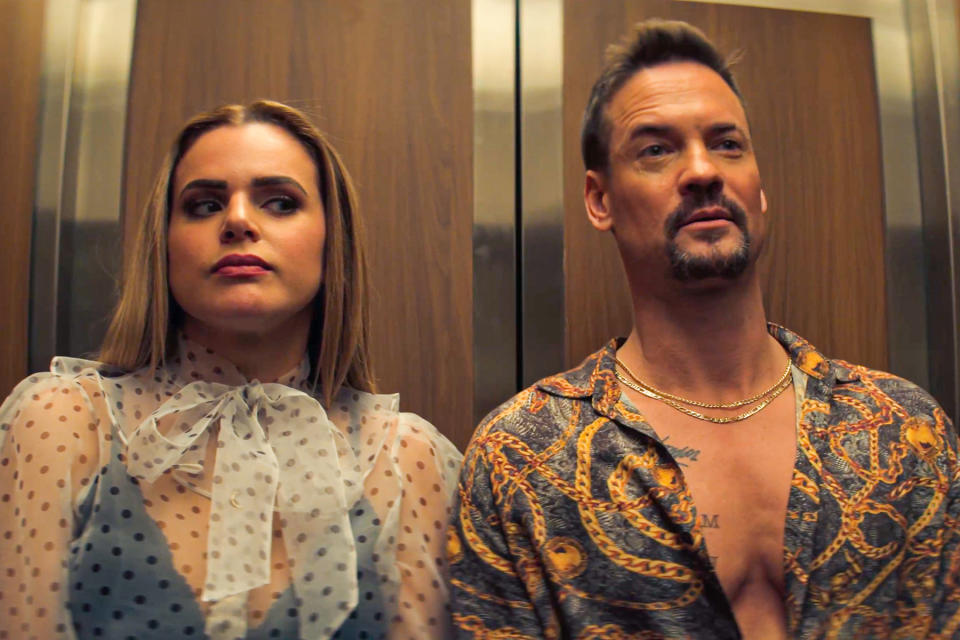How the Camp and Drama of a Beloved Nineties Telenovela Became ‘La Usurpadora The Musical’
- Oops!Something went wrong.Please try again later.

Even though it’s been decades since it first premiered, La Usurpadora remains one of the campiest, most beloved classics in the telenovela canon. Its 102-episode run was full of jaw-dropping plot twists and shocking surprises that gripped audiences from the moment the Spanish-language drama premiered in February 1998 (in Mexico, three out of every four people reportedly watched the show, which was broadcasted in more than 125 countries.)
The story followed two long-lost twins — one rich and evil, one poor and saintly, both played by actress Gabriela Spanic — and involved no less than two explosive car crashes, multiple cheating spouses, endless blackmail, an alcoholic grandma, and a scene in which a child ends up with temporary amnesia after plummeting down a cliff while walking in the middle of the street on crutches.
More from Rolling Stone
Honor Shakira, Celia Cruz, and All Latinas, Sen. Cortez Masto Tells Colleagues
Salsa Legend Celia Cruz to Become First Afro-Latina on U.S. Quarter
La Usurpadora was a hit — so much, in fact, that it’s inspired multiple remakes, including a 2019 series that broke records on Univision. Now, there’s a new and completely unexpected version coming to theaters everywhere: La Usurpadora The Musical, directed by Santiago Limón, is available in theaters starting April 7 and adds a splash of comedy and self-awareness to the story while setting the plot to some of the most famous Latin pop songs of the Nineties.
This time, actress Isabella Castillo takes on dual roles as the spiteful, scheming Victoria and the kind, well-meaning Valeria. Victoria lies to her wealthy husband about going to rehab and instead meets up with her lover — an overly tan beach bro named Chad, played by Shane West — at a glossy resort in Las Vegas. There, she comes across Valeria, a hotel employee who looks identical to her. She blackmails Valeria into trading lives with her so that she can keep hanging out with her new boyfriend. Valeria, meanwhile, goes to Mexico and quickly bonds with Victoria’s estranged family. Things take off from there, and it’s enough to give anyone whiplash — even Castillo had moments where she needed to catch her breath. “Obviously my cables got crossed and I would go up to the director like, ‘Can I have five minutes? I don’t know who I am!’” she says with a laugh.
With every wild turn, there are musical numbers that include renditions of songs like Celia Cruz’s “La Vida Es Un Carnaval,” Gloria Estefan’s “Mi Tierra,” Selena’s “Bidi Bidi Bom Bom,” and Paulina Rubio’s “Dame Otro Tequila,” updated with surprising new arrangements that fit seamlessly into 2023. Because the music plays a critical role in getting the story across, the filmmakers immediately tapped Sebastian Krys, the mega-producer with 13 Latin Grammy and eight Grammys to his name. In addition to collaborating with stars like Juanes, Shakira, and Elvis Costello, Krys also worked on some of the original versions of the pop songs in the production — and had insight into the sounds that few experts have.
“We did a methodical exercise, and because it was a Nineties telenovela, we naturally thought, ‘Let’s keep it in that era.’ We went through and researched, country-by-country and regionally, the popular songs of the decade in Latin America and ended up with a playlist of about 50 songs,” Krys explains. From there, they found songs that fit into the narrative: “When we got the script, we sat around and said, ‘Okay, here’s a slot for a musical number. What song has the lyrics that pushes the story forward?”
So much of the plot is driven by dynamic performances, many led by Castillo, who tapped into her background as a singer for the two roles. (Before moving into acting, she was signed with Warner Music Latina.) One powerful scene comes when she performs the Vicki Carr and Ana Gabriel duet “Cosas Del Amor” alongside RuPaul’s Drag Race star Valentina, who plays Valeria’s best friend Lydia in the film. Valentina, who previously starred in Rent: Live on Fox, was thrilled about getting to live out her “telenovela fantasies” and having a chance to pay homage to the Nineties version of La Usurpadora. “When I watched the original, and Gabriela Spanic, and her evil character with the dark burgundy lipstick, it was so incredible to me. It marked my childhood,” she says.
It also meant a lot to Valentina that in the new version of the story Lydia Is a non-binary character, something the film doesn’t dwell on but incorporates organically into the narrative. “We really should be pushing for more of the rights of our nonbinary and trans brothers and sisters in the U.S. right now,” she says, referencing conservative attacks on LGBTQ rights and anti-drag legislation. “If in that, we’re representing diversity, let’s break down the door and have more of this happening in Latin entertainment and in the media in general.”

Another one of the film’s most memorable character’s is the slimy lothario Chad. West says that at first, he was a little surprised that the filmmakers thought of him for the role: “When it first came to me, my first thought was ‘They’re well aware that I don’t speak Spanish, right?'” However, Chad’s storyline as Victoria’s hilarious gringo boyfriend is fully in English, and gave West a chance to explore something new. “It was such a fun story that it was hard to say no. I was doing something a little bit different and out of my comfort zone,” he explains.
Plus, he was drawn to the musical aspect of the project and he made sure to immerse himself into the sonic universe in the film. “I had a Spotify playlist of all the songs we were doing in the movie and I would only listen to that,” he says. “I kind of do that for any project, but this was the first time I was truly involved in something was so passionately based around a history and a culture, so I definitely didn’t want to mess around and screw up that up.” Originally, he even had his own dance number: One scene that ended up on the cutting room floor involved West singing Ricky Martin’s “La Vida Loca” in his underwear.
In addition to the performances, a lot of the film’s vibrancy comes from how it embraces humor and classic telenovela troupes. There are constant nods to the Latin American tradition: The kids in the film watch famous old telenovela scenes, and the theme song from the Nineties version of La Usurpadora plays in elevators. At one point, even Spanic makes a surprise cameo — one that actually hints at a potential sequel to the musical (“I was freaking out! She’s the sweetest. She’s a great person,” Castillo says.)
Ultimately, the film ends up being a tribute to some of the most beloved Latin pop culture from Nineties. It serves as a reminder of how enduring Latin classics are today and how much that era positioned Latin music to become the full global force it is today. “I think that the Nineties is really when Latin pop music came to its own,” Krys says. “It’s when the bar was raised and a lot of great writers and Latin music in general stopped looking so much to the Unite States or England and started looking inward more…And what I liked is that I have a couple of friends who wrote a couple of the songs, and being able to play the songs for them and getting exited that the song is getting a new life.”
Plus, it honors the power of telenovelas. “That’s part of our culture,” Krys says. “And it’s not a soap opera, it’s a telenovela! We should celebrate the entertainment we created for ourselves and how much we love the drama and the over-the-topness. It’s part of us.”
Best of Rolling Stone

